PRINCETON, NJ -- There is a clear division in the way Americans today perceive the job President Barack Obama is doing on issues. He gets largely positive reviews for matters related to foreign affairs, particularly terrorism and the situation in Iraq. At the same time, majorities disapprove of his handling of several fiscal-related matters, including the federal budget deficit, the economy, creating jobs, and healthcare.
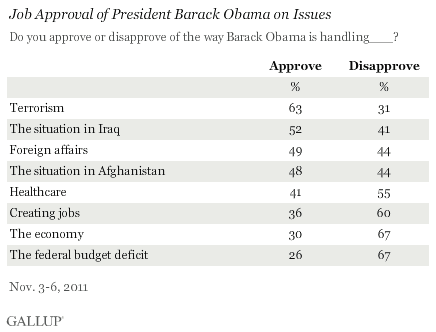
Obama's foreign policy-related approval ratings all improved from their prior readings. This probably reflects the events leading up to the Nov. 3-6 poll, including the killing of Libyan President Moammar Gadhafi on Oct. 20 by opposition forces in that country -- an event signaling the likely conclusion of the United States' military involvement there. The poll also followed President Obama's Oct. 21 announcement that he will be pulling nearly all U.S. military forces out of Iraq by year's end. A Gallup poll conducted Oct. 29-30 found 75% of Americans approving of that decision.
Obama's 63% approval rating on terrorism is up from 53% in August, and restored to where it stood in May after Osama bin Laden's death -- possibly a halo effect from Americans' satisfaction with Obama's more recent foreign policy achievements.
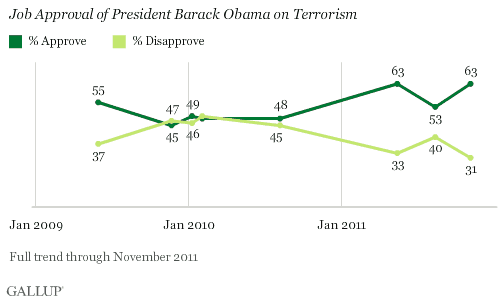
Today's 49% approval of Obama for his handling of foreign affairs, generally, may stem from Americans' support for the Iraq decision as well as the recent success in Libya. Approval of Obama had dipped to 42% in August following a spike to 51% in May after bin Laden's death. More generally, Obama's approval rating for foreign affairs is higher than it was in the last half of 2010, but still not as high as it was in 2009.
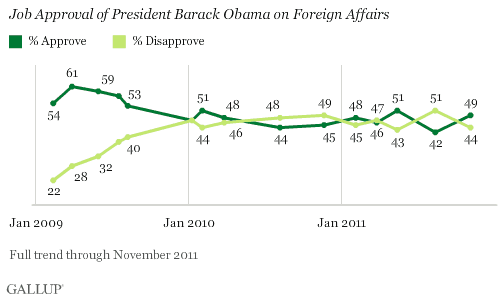
Obama's rating on Afghanistan also jumped in the new poll, to 48% from 38% in August, possibly the result of Americans' increased approval of Obama's handling of foreign affairs more broadly.
Today's 52% approval of Obama for his handling of the situation in Iraq is a sharp improvement over the 41% recorded in the last measurement, in late July/early August 2010. This likely reflects public support for his withdrawal plans. Prior to now, Obama's approval rating on Iraq had been sliding, from 57% near the start of his presidency in July 2009 to 47% in February 2010 to 41% in July/August 2010.
Economic Ratings Languishing
In contrast with his approval ratings on foreign policy matters, Obama's approval ratings on various fiscal matters have been stagnant at low levels.
The 30% of Americans now approving of Obama's job performance on the economy is the second-lowest such rating of his presidency, up just slightly from the 26% recorded in August.
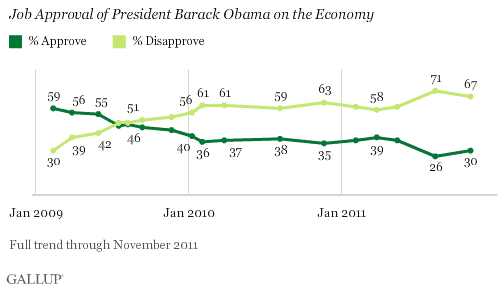
Obama is also near his term-low approval rating on the federal budget deficit. The current 26% rating is in the generally low range seen since the start of the year, after falling sharply during the first year of his presidency.
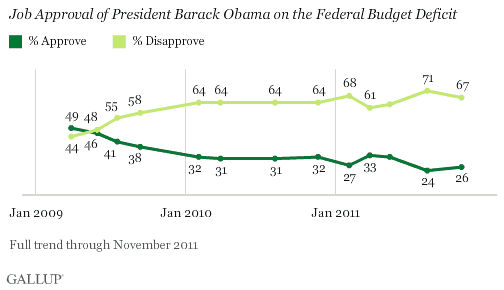
Americans' evaluation of Obama on healthcare policy has been remarkably stable for most of his presidency, with the slight majority consistently disapproving. Disapproval peaked at 60% in the month before congressional passage of healthcare reform in 2010, but it has subsequently returned to the 55% level.
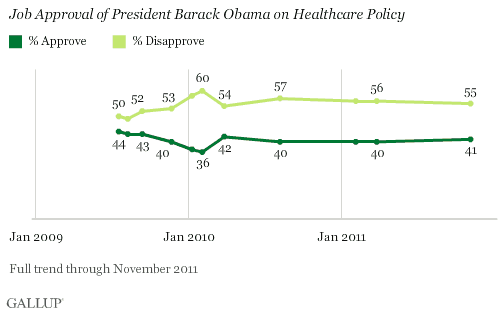
Obama's 36% approval rating for creating jobs is somewhat higher than the 29% recorded in August, prior to his September jobs initiative; however, it is still one of his lowest approval ratings in the new poll and trails the 40% who approved of him on the issue in November 2009.
Bottom Line
President Obama has two very different images with Americans when it comes to foreign affairs vs. the economy. His ratings on the former are relatively strong and on the upswing, while those on the latter are low and showing little to no improvement. How important Obama's positive ratings on terrorism -- and, to a lesser degree, Iraq -- are to helping him win a second term will depend on how important those issues are relative to the economy come Election Day. At present, Gallup finds the economy clearly trumping foreign policy in Americans' rank order of concerns.
Survey Methods
Results for this Gallup poll are based on telephone interviews conducted Nov. 3-6, 2011, with a random sample of 1,012 adults, aged 18 and older, living in all 50 U.S. states and the District of Columbia.
For results based on the total sample of national adults, one can say with 95% confidence that the maximum margin of sampling error is ±4 percentage points.
Interviews are conducted with respondents on landline telephones and cellular phones, with interviews conducted in Spanish for respondents who are primarily Spanish-speaking. Each sample includes a minimum quota of 400 cell phone respondents and 600 landline respondents per 1,000 national adults, with additional minimum quotas among landline respondents by region. Landline telephone numbers are chosen at random among listed telephone numbers. Cell phone numbers are selected using random-digit-dial methods. Landline respondents are chosen at random within each household on the basis of which member had the most recent birthday.
Samples are weighted by gender, age, race, Hispanic ethnicity, education, region, adults in the household, and phone status (cell phone only/landline only/both, cell phone mostly, and having an unlisted landline number). Demographic weighting targets are based on the March 2010 Current Population Survey figures for the aged 18 and older non-institutionalized population living in U.S. telephone households. All reported margins of sampling error include the computed design effects for weighting and sample design.
In addition to sampling error, question wording and practical difficulties in conducting surveys can introduce error or bias into the findings of public opinion polls.
View methodology, full question results, and trend data.
For more details on Gallup's polling methodology, visit www.gallup.com.
